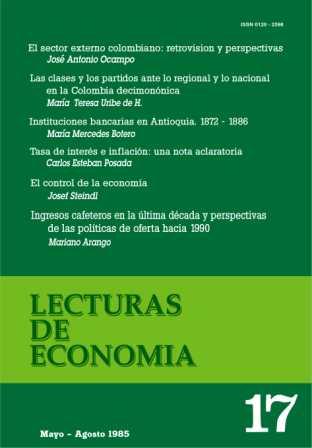El control de la economía
DOI:
https://doi.org/10.17533/udea.le.n17a10371Abstract
Resumen
Aquí se expone un diagnóstico de los principales problemas económicos que afrontan los países capitalistas desarrollados en la actualidad y se defiende un conjunto de políticas de corte keynesiano para solucionar esos problemas, vale decir, para lograr un adecuado control de la economía; se critica la teoría ortodoxa de la política económica y, sobre todo, la corriente monetarista, versión antagónica de aquella que defiende el autor. Entre las políticas para lograr un manejo adecuado de la economía se incluyen las que se refieren al desenvolvimiento económico de largo plazo y a los aspectos internacionales de la actividad económica y de su control eficiente.
Abstract
This work is a diagnosis of the main economic problems to be found in the developed capitalist countries. It is also a defense of Keynesian policies, which could be implanted to the solve these problems, namely, to achieve an adequate control of the economy. This defense implies a criticism of traditional theory of economic policy, special/y the monetarist tendency which opposes the theory followed by the author. When considering the policies which might achieve an adequate economic control, the author refers to the long run economic development; the international aspects of the economic activity and its efficient control.
Palabras claves: políticas keynesianas en los países capitalistas desarrollados, disyuntivas económicas.
Downloads
Downloads
Published
How to Cite
Issue
Section
License
This page, by Universidad de Antioquia, is licensed under a Creative Commons Attribution License.
Authors who publish with this journal agree to retain copyright and grant the journal right of first publication, with the article licensed under a Creative Commons Attribution-NonCommercial-ShareAlike License allowing others to share it as long as they acknowledge its authorship and original publication in this journal.
Authors can enter into separate, additional contractual arrangements for the non-exclusive distribution of the journal's published version of the work (e.g., post it to an institutional repository or publish it in a book), provided that these arrangements be not for profit and the journal be acknowledged as the original source of publication.
Authors are permitted and encouraged to post their papers online (e.g., in institutional repositories or on their websites), as it can lead to valuable exchanges as well as greater citation of the published work.







